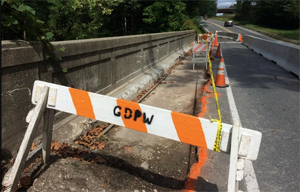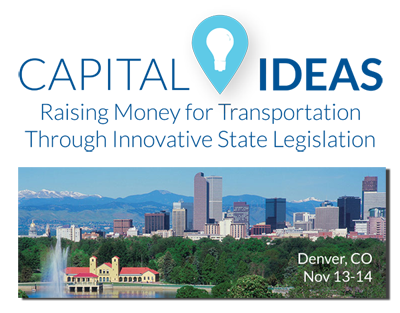
Massachusetts vote a bellwether for efforts to raise state transportation revenue

In 2013, the Massachusetts legislature came together on an ambitious plan to raise necessary revenues for transportation, passing a three-cent gas tax increase as well as indexing it to inflation. Now, a year after the legislature approved it, voters on Nov. 4 will decide whether or not to repeal part of the package.
 Though more than 20 states seriously considered plans to raise new transportation revenue since 2012, Massachusetts was on a short list of 12 states that managed to coalesce around a successful plan. The final plan to raise the gas tax by three cents and index it to inflation, providing an additional $600 million each year to invest in transportation, received at least a partial endorsement from voters this year when all but one of the legislators who supported it won their primary elections.
Though more than 20 states seriously considered plans to raise new transportation revenue since 2012, Massachusetts was on a short list of 12 states that managed to coalesce around a successful plan. The final plan to raise the gas tax by three cents and index it to inflation, providing an additional $600 million each year to invest in transportation, received at least a partial endorsement from voters this year when all but one of the legislators who supported it won their primary elections.
However, an anti-tax organization took issue with the move to allow the gas tax to rise with inflation and gathered enough signatures to get it on this year’s ballot.
About a third of states index their gas taxes to ensure that growing construction costs don’t result in a net loss of funding to maintain and build their networks. This has become especially important as declining driving and improved fuel efficiency are further reducing revenue from the fuel taxes that provide the bulk of transportation funding. (Question 1 on the ballot only repeals the indexing to inflation, not the three-cent increase, which will stay in place no matter how this measure turns out.)
Supporters of the measure argue that taxes shouldn’t automatically increase without legislative action. The flip side of that argument is that leaving them at a static level basically amounts to regular tax breaks in today’s dollars.
States have all the more reason to index to inflation given the declining contribution expected from the federal program, given a Congress that has not acted to raise the gas tax since 1993.
Kristina Egan, the director of Transportation for Massachusetts, offered further reasons to index to Governing Magazine:
[Egan] said requiring legislators to vote on gas tax hikes every year is “impractical,” because the state legislature focuses on transportation, at most, every five or six years. Because transportation projects typically take years to plan and build, she said, “having a predictable and stable revenue source helps us think ahead for which bridges we can repair and which we can’t afford. If you put that up for a vote every year, you’re undermining that planning process.”
Massachusetts has one of the oldest transportation systems in the country, and even with a focus on repair and maintenance, the backlog of deferred maintenance is outpacing the revenues that the current model brings in.
At an average age of 57 years, Massachusetts has some of the oldest bridges in the entire country, well over the national average of 43 years old. The average age of all structurally deficient bridges is an astonishing 75 years old, also well outpacing the national average of 65. Twenty-seven bridges have been closed altogether in recent years. According to state data, bad roads and potholes cost drivers $2.3 billion per year. Improving the ability of the state to simply keep up with these kinds of repairs is a major focus for the coalition of groups and organizations (http://saferoadsbridges.com/) opposing this ballot measure to repeal funding.
The state is still paying for the Big Dig, and nearly 100 percent of the transit authority’s fares (MBTA) actually go towards paying down debt service on the state’s transportation debts, making it a financial challenge to maintain and expand new service to meet the burgeoning demand in the growing metro region. (The Big Dig debt ended up on the “T” books a few years ago when transportation agencies were merged.)
Question 1 has been an issue in this year’s gubernatorial election as well. Republican Charlie Baker has been campaigning on repealing the indexing of the gas tax, and Democratic challenger Martha Coakley wants to keep the current funding system intact.
There’s a significant coalition statewide opposing the measure, including business groups, the local AAA chapter, more than a dozen mayors, public health groups, and others. As Rick Dimino, President & CEO of A Better City in Boston, wrote in recent op-ed (pdf):
Losing this money for transportation means that we won’t have adequate resources for critical investments that will grow jobs and the economy…The outcome of this ballot question will impact the day to day quality of life for virtually everyone in the commonwealth. The gas tax may not be everyone’s favorite thing or even the ideal way that some would want to pay for transportation. But the vote to keep last year’s progress in place should be an easy choice
The Massachusetts vote will be watched with great interest in many other states that have or are considering plans to raise new transportation dollars in 2015 and beyond. We’ll be watching the returns and will be reporting back here in detail on how Question 1 fares at the ballot.
 Do you live in one of those states that are considering plans to raise new transportation dollars in 2015 and beyond? Do you want to learn more about this campaign in Massachusetts and hear lessons direct from the MA campaign on this measure? We’ll have Kristina Egan from Transportation for Massachusetts on hand in Denver for Capital Ideas on Nov. 13-14, unpacking the lessons they’ve learned from their campaign to raise transportation funding in MA, as well as this effort to repeal it. Don’t miss it!
Do you live in one of those states that are considering plans to raise new transportation dollars in 2015 and beyond? Do you want to learn more about this campaign in Massachusetts and hear lessons direct from the MA campaign on this measure? We’ll have Kristina Egan from Transportation for Massachusetts on hand in Denver for Capital Ideas on Nov. 13-14, unpacking the lessons they’ve learned from their campaign to raise transportation funding in MA, as well as this effort to repeal it. Don’t miss it!



